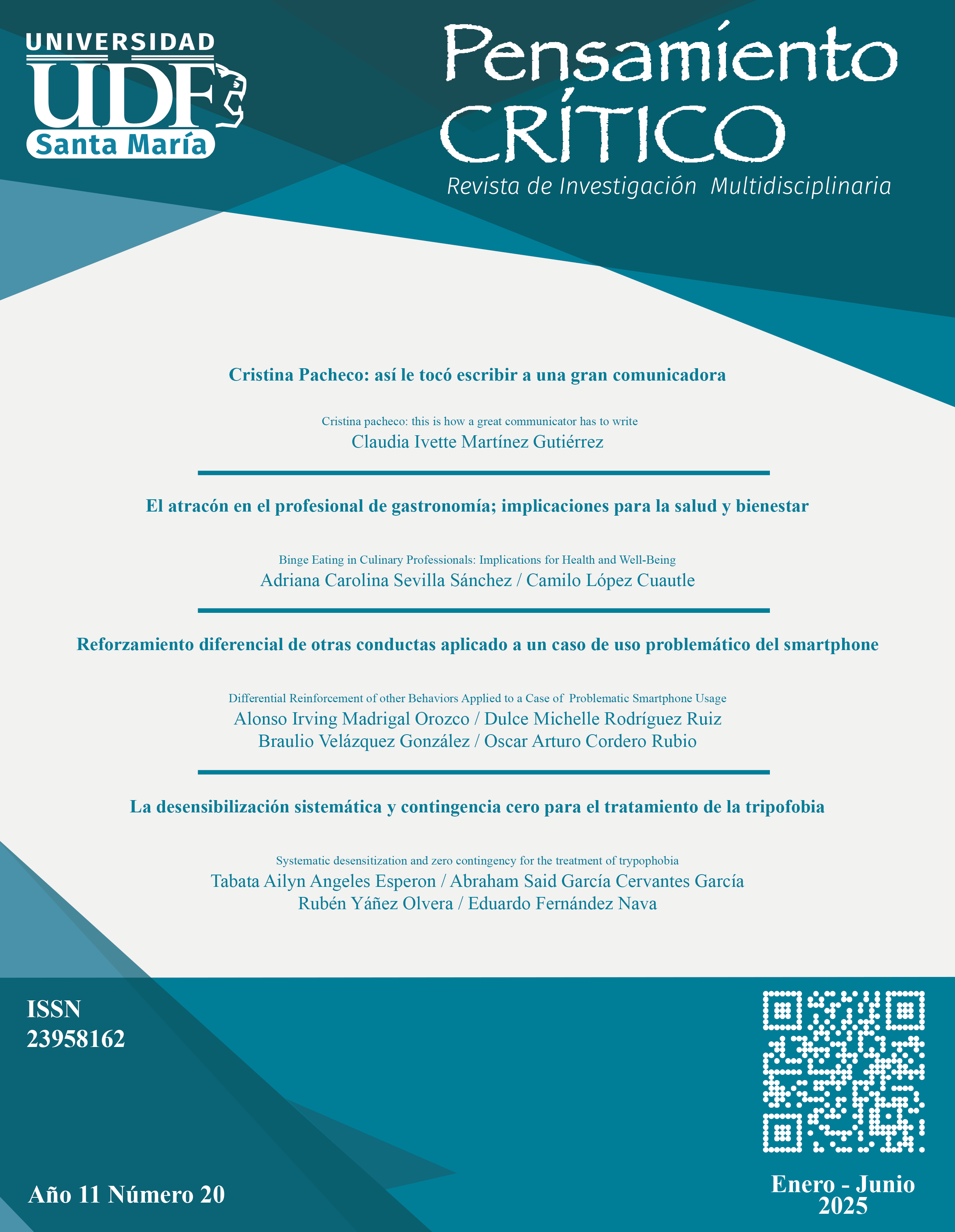Resumen
El uso problemático del smartphone (UPS) es un fenómeno que afecta la manera en que los individuos socializan y se desempeñan en distintos ámbitos sociales, y que se caracteriza principalmente por un uso excesivo del dispositivo. El UPS es frecuente en grupos de edad comprendidos entre los 14 y los 24 años; sin embargo, se ha identificado que esta problemática también afecta a niños desde la edad preescolar hasta la adolescencia. Ante esta situación, se han desarrollado diversas propuestas de intervención con el objetivo de reducir el tiempo de uso del smartphone o celular. En el presente estudio se presentan los efectos de una intervención basada en la técnica de Reforzamiento de Otras Conductas (RDO) sobre el tiempo de uso del celular en una participante de nueve años. Los resultados muestran una disminución en el tiempo de uso como efecto de la intervención. Se discuten las implicaciones de estos resultados para el área.
Referencias
Borgeaund, A. (2024). Market share of smartphone brands in Mexico 2020-2024 [Infografía]. Statista. https://www.statista.com/statistics/867948/market-share-smartphone-brands-monthly-mexico/
Bröhl, C., Rasche, P., Jablonski, J., Theis, S., Wille, M., Mertens, A. (2018). Desktop PC, Tablet PC, or Smartphone? An Analysis of Use Preferences in Daily Activities for Different Technology Generations of a Worldwide Sample. In: Zhou, J., Salvendy, G. (Eds) Human Aspects of IT for the Aged Population. Acceptance, Communication and Participation. ITAP 2018. Lecture Notes in Computer Science, vol 10926. Springer, Cham. https://doi.org/10.1007/978-3-319-92034-4_1
Busch, P. A., & McCarthy, S. (2021). Antecedents and consequences of problematic smartphone use: A systematic literature review of an emerging research area. Computers in human behavior, 114, 106414. https://doi.org/10.1016/j.chb.2020.106414
Ceci, L. (2024). Most popular smartphone activities for global users 2023 [Infografía]. Statista. https://www.statista.com/statistics/1337895/top-smartphone-activities/
Chan, S., Yeo, K., & Handayani, L. (2023). Types of smartphone usage and problematic smartphone use among adolescents: A review of literature. International Journal of Evaluation and Research in Education, 12(2), 563-570.
Chow, T. C. L., & Ma, W. W. (2017). Do We Really Know What People are Using Their Smartphone for?. In 2017 International Symposium on Educational Technology. 34-38.
Csibi, S., Griffiths, M.D., Demetrovics, Z. & Szabo (2021). Analysis of Problematic Smartphone Use Across Different Age Groups within the ‘Components Model of Addiction’. International Journal of Mental Health and Addiction, 19. 616-631 https://doi.org/10.1007/s11469-019-00095-0
Extremera, N., Quintana-Orts, C., Sánchez-Álvarez, N., & Rey, L. (2019). The role of cognitive emotion regulation strategies on problematic smartphone use: Comparison between problematic and non-problematic adolescent users. International journal of environmental research and public health, 16(17), 3142. https://doi.org/10.3390/ijerph16173142
Firmansyah, R. O., Hamdani, R. A., & Kuswardhana, D. (2020). The use of smartphone on learning activities: Systematic review. IOP Conference Series: Materials Science and Engineering, 850 (1), 012006. https://doi.org/10.1088/1757-899X/850/1/012006
Gui, M., Gerosa, T., Argentin, G., & Losi, L. (2023). Mobile media education as a tool to reduce problematic smartphone use: Results of a randomised impact evaluation. Computers & Education, 194, 104705. https://doi.org/10.1016/j.compedu.2022.104705
Hernández, R., Fernández, C., & Baptista, P. (2014). Metodología de la investigación. McGraw Hill España.
Horwood, S., & Anglim, J. (2019). Problematic smartphone usage and subjective and psychological well-being. Computers in Human Behavior, 97, 44-50. https://doi.org/10.1016/j.chb.2019.02.028
Instituto Nacional de Estadística Geografía e Informática (2023). Encuesta Nacional sobre Disponibilidad y Uso de Tecnologías de la Información en los Hogares. https://www.inegi.org.mx/programas/endutih/2023/
Kazdin, A. (2000). Modificación de la conducta y sus aplicaciones prácticas (Virginia Sánchez Rivas, Trans; 2da ed.). Manual Moderno. (Publicación original 1996).
Kemp, S. (2025). Digital 2025: Global Overview Report [Infographic]. Data reportal. https://datareportal.com/reports/digital-2025-global-overview-report
Kent, S., Masterson, C., Ali, R., Parsons, C. E., & Bewick, B. M. (2021). Digital intervention for problematic smartphone use. International journal of environmental research and public health, 18(24), 13165. https://doi.org/10.3390/ijerph182413165
Liu, F., Zhang, Z., Liu, S., & Feng, Z. (2022). Effectiveness of brief mindfulness intervention for college students’ problematic smartphone use: The mediating role of self-control. PLoS One, 17(12), e0279621. https://doi.org/10.1371/journal.pone.0279621
Malinauskas, R. & Malinauskiene, V. (2019). A meta-analysis of psychological interventions for Internet/smartphone addiction among adolescents. Journal of Behavioral Addictions, 8(4), 613-624. https://doi.org/10.1556/2006.8.2019.72
Matson, J. L., & Kazdin, A. E. (1981). Punishment in behavior modification: Pragmatic, ethical, and legal issues. Clinical Psychology Review, 1(2), 197-210. https://doi.org/10.1016/0272-7358(81)90003-9
Montag, C., Błaszkiewicz, K., Sariyska, R., Lachmann, B., Andone, I., Trendafilov, B., ... & Markowetz, A. (2015). Smartphone usage in the 21st century: who is active on WhatsApp?. BMC research notes, 8, 1-6. https://doi.org/10.1186/s13104-015-1280-z
Olson, J., Sandra, D., Chmoulevitch, D., Raz, A. & Veissiere, S. (2023). A Nudge‑Based Intervention to Reduce Problematic Smartphone Use: Randomised Controlled Trial. International Journal of Mental Health and Addiction, 21, 3842-3864. https://doi.org/10.1007/s11469-022-00826-w
Park JH, Park M (2021) Smartphone use patterns and problematic smartphone use among preschool children. PLoS ONE 16(3): e0244276. https://doi.org/10.1371/journal.pone.0244276
Rajagopal, P. & Perveen, A. (2024). Self-administered behavior modification to reduce smartphone usage. Evaluation Studies in Social Science, 5, 98-105. https://doi.org/10.37134/esss.vol5.1.7.2024
Ryding, F. & Kuss, D. (2020). Passive objective measures in the assessment of problematic smartphone use: A systematic review. Addictive Behaviors Report, 11, 100257. https://doi.org/10.1016/j.abrep.2020.100257
Sohn, S., Rees, P., Wildridge, B., Kalk, N. & Carter, B. (2019). Prevalence of problematic smartphone usage and associated mental health outcomes amongst children and young people: a systematic review, meta-analysis and GRADE of the evidence. BMC Psychiatry, 19K, 356. https://doi.org/10.1186/s12888-019-2350-x
Statista Research Department, (2025). Number of smartphone users worldwide 2014-2029 [Infographics]. Statista. https://www.statista.com/forecasts/1143723/smartphone-users-in-the-world
Stevic, A., Schmuck, D., Matthes, J., & Karsay, K. (2021). ‘Age Matters’: A panel study investigating the influence of communicative and passive smartphone use on well-being. Behaviour & Information Technology, 40(2), 176-190. https://doi.org/10.1080/0144929X.2019.1680732
Van Velthoven, M. H., Powell, J., & Powell, G. (2018). Problematic smartphone use: Digital approaches to an emerging public health problem. Digital Health, 4, 2055207618759167. https://doi.org/10.1177/2055207618759167
Zarei, S. & Mohammadi, S. (2022). Challenges of higher education related to e-learning in developing countries during COVID-19 spread: a review of the perspectives of students, instructors, policymakers, and ICT experts. Enviromentl Science and Pollution Research, 29, 85562-85568. https://doi.org/10.1007/s11356-021-14647-2

Esta obra está bajo una licencia internacional Creative Commons Atribución-NoComercial-SinDerivadas 4.0.
Derechos de autor 2025 Pensamiento Crítico. Revista de Investigación Multidisciplinaria


